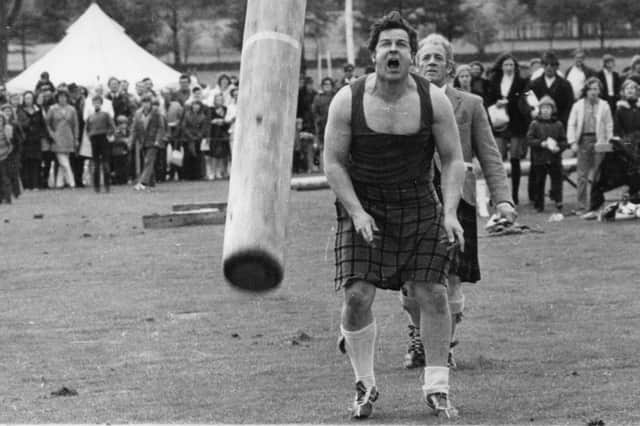Scotsman Obituaries: Charlie Allan, Highland Games athlete, academic and entertainer


Charlie Allan was an incredibly talented individual who excelled in a diverse range of activities – a top Highland Games athlete and all-round sportsman, an academic, farmer, author, bothy ballad singer, composer and entertainer, publisher, broadcaster and champion of Doric. A World Caber Tossing Championship winner, he was also capable, despite his bulk, of a very decent high jump, often in his kilt – to the delight and amusement of spectators at the Games. Although this suggested an element of showmanship, he was wholehearted in his commitment to all the varied interests in which he enjoyed much success. A convivial and entertaining character, Charlie’s company provided much fun.
Charles Maitland Allan was born to John R Allan and Jean (nee Mackie) in Stirling. His father was a well-known journalist and author who wrote A Farmers’ Boy, an excellent farming memoir, while his mother was a teacher.
Advertisement
Hide AdAdvertisement
Hide AdIn wartime, with his father away on service and his mother working, Charlie moved around a lot in his early days, including a period living with maternal grandparents on their Aberdeenshire farm at North Ythsie, a time which was influential in his upbringing. Once war finished his family settled into their farm, Little Ardo at Methlick, the fifth family generation there.
His parents were advocates of “progressive education,” which prohibited corporal punishment and favoured a more flexible approach to learning. Charlie attended a boarding school at Culter, Aberdeen, before going to his mother’s own private school in the city. By then a glimpse had been caught of developing talents with Charlie, aged ten, having sung a bothy ballad on BBC’s Children’s Hour. A few years later he won £4 at the New Deer Sports in various events.
For secondary education he boarded at Dartington Hall in Devon, where he enjoyed its informal atmosphere, football, cricket and occasional local ale.
Charlie’s football talent led to him being invited to train for a month with Aberdeen at Pittodrie and thereafter being offered terms with a Highland League club. Instead he opted to play junior football before beginning studying Economics at Aberdeen University.
He combined studies successfully with pursuing his various sporting interests as captain of the basketball team, being a member of the cricket 1st XI and occasionally pack leader for the rugby 1st XV, a sport he only took up after a football injury. Having had to adapt, he was soon established in the team, his highlight being a win over a powerful London Scottish XV containing several internationalists.
Charlie also shone at athletics, regularly winning prizes at the Annual Sports, especially in throwing and jumping events. And academically he also shone, graduating with a First Class Honours Degree.
By then he had begun competing in Highland Games using the pseudonym “Ivor Smith”, to protect his amateur status, as Games which awarded cash prizes then were deemed professional. This caused certain anguish as the use of pseudonyms was banned in the Games; the difficulty was resolved after a couple of years with Charlie resorting to his own name.
Over 17 years Charlie was a leading light on the Games circuit, becoming a top heavyweight athlete who, tongue in cheek, referred to himself as Charles the Third, given the dominance of all-time greats Bill Anderson and Arthur Rowe. When younger he was also an accomplished jumper and was proud of having won the prestigious Chieftain’s Challenge Cup at Aboyne Games, for the best “all-rounder” at light and heavy events.
Advertisement
Hide AdAdvertisement
Hide AdAnother major success was winning the World Caber Tossing Championship at Aberdeen Highland Games in 1972, while he was runner-up in 1973 at Geelong, Australia. Other highlights included being part of an eight-week “Games Exhibition” event in the Bahamas, and taking part in Highland Games in San Francisco and Tokyo, where his caber narrowly missed the pipe band. Charlie also wrote an informative short book on the Games.
Professionally, he held lecturing posts in economics at Glasgow, St Andrews and Strathclyde Universities, contributing papers to academic journals and wrote a book on taxation prior to taking over Little Ardo, becoming the sixth generation to farm there, in the mid-Seventies. He undertook updating and modernising equipment and methods while having success rearing foreign cattle, especially Simmentals, winning the Supreme Championship at Perth Bull Sales.
That led to broadcasting work with Radio Scotland and Radio Four, presenting Scottish Farming News and Farming Today programmes, while he also contributed a popular weekly Farmer’s Diary column to the Glasgow Herald and acquired north east magazine, Leopard. After a three-year sabbatical in Kenya, accompanying wife Fiona in her computer analysis work, Charlie continued farming until 1997 when daughter Sarah and husband Neil took over Little Ardo, the seventh generation involved.
He ran two marathons in the 1980s, while a decade later he turned to cycling, which he loved, and despite a heavy build he succeeded in covering 100 miles in 4½ hours on a charity ride, aged 59. He was instrumental in setting up Methlick Cricket Club in its attractive ground, which he jokingly called “Laird’s,” now an excellent community asset. Another interest was bothy ballads, which he enjoyed composing and singing in various locations, which stimulated his enthusiasm for the use of Doric.
At Aberdeen University sports ground Charlie met Fiona Vine, a junior lecturer and good athlete herself. They wed in February 1961 and enjoyed a long, happy marriage during which they had Sarah, John, Jay and Susan. Fiona supported Charlie unreservedly in all his activities. He is survived by her, their children, ten grandchildren and four great grandchildren.
Obituaries
If you would like to submit an obituary (800-1000 words preferred, with jpeg image), or have a suggestion for a subject, contact [email protected]